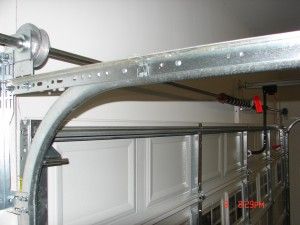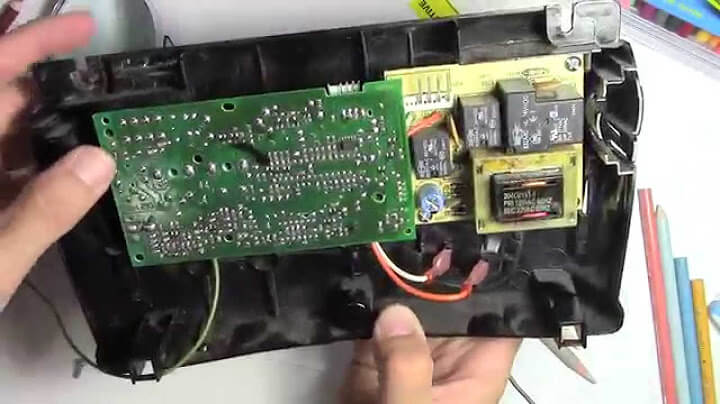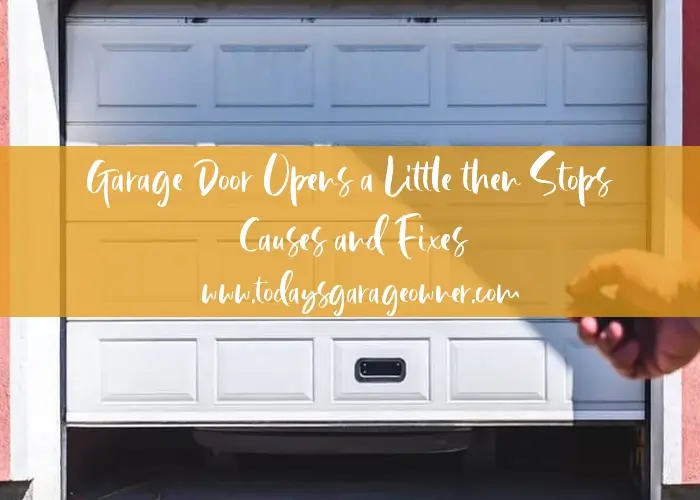I once got shut out of my garage. My garage door opened for just about 20 inches then stopped. I couldn’t get my car out. It was quite frustrating!
Garage doors fail. Nothing unusual. Sometimes, the garage door opens a little then stops. And sometimes, the door fails to open at all.
The last time my garage door failed, I tried a lot of pretty effective fixes. So I wrote this article to document my experience and share with you some of the possible fixes when your garage door opens only a few inches then stops.
Reasons why your garage door opens a little then stops
There are many reasons why your garage door might fail. Failure of the door might be attributed to one of these reasons:
- Dysfunctional motor
The motor provides the power that lifts the garage door. A broken or dysfunctional motor is one of the possible reasons why your garage door opens a little bit then stops.
A broken motor normally produces rattling and squeaky noises. If your garage door opens then stops, be sure to first check the garage door opener motor and whether it’s working appropriately.
- Obstruction along the tracks
Another possible reason for garage door failure is clogged-up tracks. Some dirt particles and debris might accidentally land on the tracks of the garage door opener, therefore, obstructing the path of the door.
The door is designed to automatically stop once it encounters any obstruction along its path. To sort this issue, ensure that there are no foreign particles along the tracks of the garage door.
- Bent tracks
Bent tracks are another possible source of garage door malfunction. Tracks are part of the garage door system. They help in moving the door up and down.
Tracks are normally made of steel or aluminum. The tracks of the garage door might get bent due to the excess weight of the door.
Bent tracks mean that the path of the door is not clear therefore causing the door to stop when it reaches the bent part of the track.
- A faulty logic control board
The logic board is the component responsible for communicating with the remote control. It receives and responds to signals sent from the remote control.
Depending on the lifespan of the garage door opener, and the frequency of usage, the logic control board may wear out leading to malfunction. When this happens, consider replacing the logic control board.

You might also try to reboot the entire system to reset everything. Finally, if all these measures fail, consider replacing the entire garage door opener system.
- Messed up photo-eye
The photo-eye is a sensor responsible for mapping out the path of the door and spotting any obstacles. Once the photo-eye spots obstacles in the path of the door, it automatically triggers the door to stop and in some cases reverse.
A misaligned photo-eye might be a potential cause of garage door malfunction. A misaligned photo-eye maps the wrong path for the door, therefore, leading to malfunction.
Ensure that the photo-eye is clean and is not obstructed by any dirt or debris.
- Broken springs
Garage doors feature either a torsion spring or an extension spring. These springs are responsible for the heavy lifting (literally). They are responsible for opening and closing the garage door.
Torsion springs are installed on top of the garage door while extension springs are fitted on either side of the garage door.
Spring breakage is a major cause of door malfunction. Check the status of the spring and replace it if broken.
The easiest way to determine whether the spring is broken is to disconnect the cord from the garage door opener and lift the door manually. If the door is extremely heavy to lift then the spring is probably broken or defective.
Ensure you replace broken springs immediately. You can replace the springs yourself or seek the help of a garage door expert.
- Force adjustment and travel limit
Modern garages have a travel limit and force adjustment control. The travel limit controls the distance the garage door can open while in use.
The force adjustment on the other hand controls and regulates the exact amount of pull required to open the door completely.
When the door fails, chances are that it’s one of these issues. Probably the travel limit has been set to restrict the door from fully opening or the force adjustment is not set up correctly.
Ensure that the travel limit is well set and make the necessary adjustments. Make sure to also adjust the force adjustment to prevent accidents and door damages.
My Garage door opens a little then stops – 4 Practical Solutions
The last time my garage door malfunctioned was frustrating for me. Who wouldn’t be frustrated when locked out of their garage on a busy weekday?
Fortunately for me, the cause of this malfunction was a mere obstruction along the tracks. All I had to do was clear the log of wood along the door’s path.
This might not be the case for you though. So let’s explore some of the available quick fixes when your garage door develops this behavior.
Check the tracks

Your garage door might fail due to obstructions along the tracks or due to a bent track.
Your garage door is set to automatically stop and reverse when it collides with debris and any other foreign particles. Ensure to check the tracks and clear any debris.
Bent tracks interrupt the motion of the door causing it to stop. Check to see if the track is bent.
Test the logic control board
Garage door malfunction is not solely attributed to mechanical failure. Sometimes, the garage door fails to open as a result of logic control board failure.

Test and ascertain whether the logic board is still functional – and if it still is, then reprogram your garage door opener to fix garage door malfunction.
The easiest way to test the logic control board is to use an ohmmeter. You may also seek the services of a specialist.
Clean and align the photo-eye

The photo-eye maps out and monitors the path of the garage door. A dirty or misaligned photo-eye could be among the reasons for garage door malfunction. Ensure that the photo eye is aligned and clean. You can easily reference the garage door opener manual for information on how to align the photo-eye.
Test the motor
The motor, just like any other mechanical part may wear out and eventually fail. When your garage door opener motor fails, your garage door is set to malfunction. Contact a garage door specialist to test and ascertain the health of your motor.
How do I know my garage door is about to fail?
Just like any other mechanical system, garage doors are bound to fail after some time. However, most garage owners only realize the failure when the garage door ceases to open or close.
Garage doors rarely fail without warning. In most cases, your garage door will show you some signs way before failing.
Frequent inspections help garage owners to spot the imminent failure of the garage door system. Here are several signs of a failing garage door:
1. Unusual noise during cycles
2. The garage door opens intermittently
3. Vibration on the door opener
4. Erratic patterns in opening and closing cycles
5. Slow-moving garage door
Let us now dig deeper into these signs that help you spot the imminent failure of your garage door opening system.
- Unusual Noise during Opening Cycles
Just like many mechanical objects, garage doors make noise while in operation. However, certain noises are indicative of a failure or imminent failure.
When the noise during opening and closing cycles exceeds the normal operational noise, it is definitely a worrying sign and a call for attention.
- The Garage Door Opens Intermittently
If it takes several clicks on the remote controller to open the garage door, then there is definitely a problem with the garage door opener. This problem could spring from several sources.
To address this problem, try replacing the batteries in the remote controller. If this fails to work, try checking on the sensors of your garage door opener. Also frequently lubricate the moving parts of your system.
- Vibrations on the Garage Door Opener
Though vibrations and noises are common in any mechanical system during operation, excess vibrations could signal a problem. You may need to seek the services of professionals when your garage door opener frequently vibrates while opening and closing the door.
- Slow Moving Garage Door
This is normally the most common sign of a failing garage door opener. When the garage door moves significantly slower than normal, there certainly is a problem with the system.
To address this problem, check on the chains or belts that drive the system. Also, lubricate the moving parts of the system. If the slow movements continue, seek the services of a professional.
- The Door Does Not Stop When Something Is In its Way
This is a common problem for failing garage door openers. Normally, garage doors are designed to stop once they sense the presence or encounter an object on their path.
When your door fails to detect an object on its path, it is probably time to check on the photo-eye and the sensors. Check on the sensors and ascertain whether they need replacing.
How do I prolong the lifespan of my garage door opener?
Garage door openers typically last for 10 to 12 years. However, with good maintenance and some other best practices, you can prolong the lifespan of your garage door opener by up to 18 years.
Here are some of the measures to prolong the lifespan of your garage door opener:
Ensure proper installation and configuration
One of the most common reasons for garage door opener failure spurs from improper installation. Garage door openers are easy systems to install – but you still may get it wrong.
Ensure that the garage door opener is correctly installed and all components are correctly fitted. Ensure that all the settings are done right and every configuration is as recommended by the manufacturer.
Always refer to the manual that comes with the garage door opener. This guides you with the installation process and guides you on how to use the opener just as the manufacturer intended.
Frequent maintenance
Maintenance can easily prolong the lifespan of your garage door opener by 3 to 6 years. With proper maintenance, your garage door opener can last for up to 18 to 20 years.
Maintenance should be done frequently. Ensure to thoroughly inspect your system from time to time. Check for dysfunctional sensors, broken springs, and any other dysfunctional components. Ensure you replace dysfunctional components.
Frequent lubrication is very essential for your system. It reduces system wear and tear therefore prolonging system lifespan. Ensure to use the right lubricant for your garage door opener as well.
Frequently Asked Questions
Oftentimes, a garage door that opens a little then stops has other issues that may be accompanied with it. Some of these issues are addressed below.
Q: Why does my garage door keep stopping halfway?
Garage door openers stop immediately if they encounter an object or any obstruction along their path. Ensure that the track is clear of any debris or foreign particle to sort this problem.
Q: Why does my garage door stop and go back up?
Garage doors have safety sensors that trigger an immediate stop and reversal should the sensors detect any obstruction along the path of the garage door. This is a safety measure in most garage doors and helps to prevent accidents while the garage is in operation.
Q: How do I know if my garage door sensor is out of alignment?
You can easily tell whether the door sensors are out of alignment using light sensors. The sensors are perfectly functional and in alignment when the exterior LED light blinks green while closing the door. red light means the sensors are not aligned.
Q: How long do garage door openers last?
Garage door openers typically last for 10 to 12 years. However, with frequent maintenance, you can extend the lifespan of your garage door opener up to 18 years.
Q: Can I buy replacement parts for my garage door opener?
Yes. You don’t have to replace the whole garage door opener when one component fails. You may buy and fit replacement parts for your garage door opener.
Wrap Up
Garage doors will always fail. That’s guaranteed! However, not every garage door failure requires the attention of garage door experts. You can easily fix some failures with simple solutions such as clearing the tracks as I’ve highlighted above.
Ensure you check the tracks, the springs, the motor, and the logic board when your garage door opens a little then stops. Make sure that the travel limit and force adjustments are well set, and the remote control is well configured.
It all comes down to a timely and frequent maintenance routine. Maintenance helps you to keep the system perfectly functional without intermittent failure and prolong the lifespan of your garage door system. Ensure you do it frequently and on time.
That was my experience. Share with me in the comments section your experience or any feedback and let’s explore how to have a seamless garage experience!

